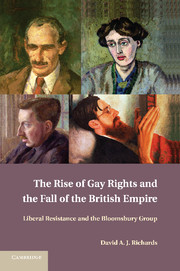 The Rise of Gay Rights and the Fall of the British Empire
The Rise of Gay Rights and the Fall of the British Empire 6 - Gay Rights as Universal Human Rights
Published online by Cambridge University Press: 05 June 2014
Summary
My argument is about an ethical discovery, what I call gay rights, which in turn led to new and increasingly resonant arguments about the legal recognition of such rights, often through forms of constitutional argument. There have, of course, been other ethical discoveries in our human history: democracy was one such discovery, as were human rights, the intrinsic wrongness of slavery, and the wrongness of the subjection of women. I regard these as ethical discoveries because, for long periods of human history, we lived without them, indeed regarded some of them (for example, slavery and the subjection of women) as the nature of things. Once discovered, these ethical discoveries transformed the human world, imposing ethical responsibilities and extending freedoms in ways that were once unthinkable but now are the measure of ethical seriousness and integrity.
Homosexuality has, of course, been around a long time, probably throughout our history and prehistory as a species; its presence throughout the animal and human world suggests as much. I take it that sexual attraction, inclination, and desire, as well as deep-rooted emotional connection, whatever its objects, are general human properties. But the ways in which we understand and respond to them, and in turn reason normatively in relation to them, is likely to differ radically depending on the society and time period in which we live. Carol Gilligan and I have argued that one of the most important factors in human history shaping our normative understanding of sexuality and gender has been patriarchy extending over time (from the agricultural revolution) and cultures, and has thus sometimes been naturalized as in the nature of things (see Chapter 1). The values and institutions of democracy are, however, in tension with patriarchy, and resistance to patriarchy is, we argued, rooted in our human natures and based on defensible ethical values of equal dignity and human rights. Thus, patriarchy is a cultural institution that we may and should criticize and change. Our study of resistance over time has, in turn, led us to identify the powerful psychological role in resistance of breaking the patriarchal Love Laws.
- Type
- Chapter
- Information
- The Rise of Gay Rights and the Fall of the British EmpireLiberal Resistance and the Bloomsbury Group, pp. 231 - 244Publisher: Cambridge University PressPrint publication year: 2013


